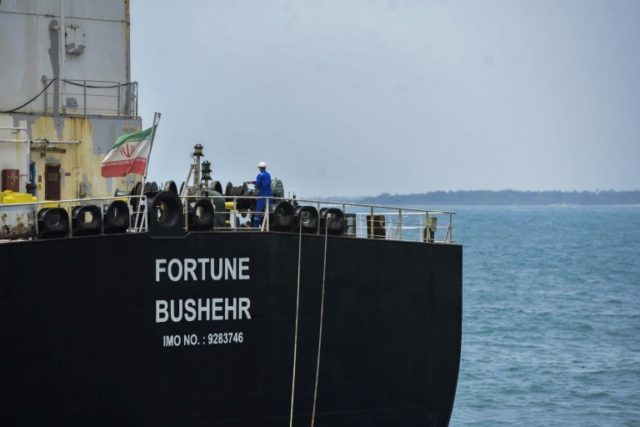Caracas (AFP) – The first of five Iranian tankers carrying much-needed gasoline and oil derivatives docked in Venezuela on Monday, Caracas announced amid concern in Washington over the burgeoning relationship between countries it sees as international pariahs.
In a statement delivered on state television, Oil Minister Tareck El Aissami said the convoy was an expression of the Venezuelan people’s “self-determination” and praised Tehran’s friendship at a time of need.
“What great fortune to have Iran in these times,” said the minister, surrounded by members of the military leadership.
Earlier, El Aissami triumphantly shared images on Twitter of the first ship, “Fortune” arriving at El Palito refinery on Venezuela’s northwest coast.
“We keep going and WINNING!” El Aissami wrote.
The United States has closely monitored the shipments, concerned that Iran and Venezuela — both under US sanctions — were taking their longstanding ties to another strategic level.
The Iranian tankers have run the gauntlet of US warships arrayed off the Venezuelan coast after Washington announced last month it was stepping up its naval presence, arguing there was an increase in organized crime.
Tensions between Washington and Caracas remain high following Venezuela’s disruption last month of an abortive military assault by a group of mercenaries coordinated by a private US security company.
The US has stepped up sanctions against socialist President Nicolas Maduro and his inner circle, recently offering a $15 million reward for Maduro accusing him of masterminding a drug-smuggling ring.
Washington and more than 50 other states accuse Maduro of stealing 2018 elections and instead recognize his opposition rival Juan Guaido as interim president.
Vital shipment
The vital shipment arrives at a time of chronic fuel shortages in the crisis-wracked South American country, exacerbated by the coronavirus lockdown.
In Caracas, where drivers lined up for hours to fill their tanks, Tehran’s helping hand was viewed with a mixture of hope and suspicion.
Osvaldo Rodriguez, 22, doubts the fuel “is for us,” but instead destined for those with their hands on the levers of power in Venezuela.
“If gasoline is sold at the same price as abroad, nobody will be able to afford it,” he said, alluding to Venezuela’s minimum wage of $4.60 a month.
Gasoline is currently selling for up to three dollars a liter on the black market in Caracas, unheard of in a country where motorists are used to filling up for practically nothing.
“We have no shortage of oil! Supposedly we are sitting on five billion barrels of it underground. But there’s no gasoline,” said Teodoro Lamonte, 50, as he slowly rolled his car along a line outside a service station.
Venezuela boasts the largest proven oil reserves in the world, but production has plummeted under the current regime and its oil exports have been hampered by US sanctions.
The Fortune arrived in Venezuela’s territorial waters on Saturday night, escorted by the Venezuelan navy.
The navy on Twitter said its ships were escorting a second tanker, the Forest, which it said entered the country’s waters early Monday.
The other Iranian tankers — Petunia, Faxon, Clavel and Forest — will arrive in the next few days, state television said.
The fleet is carrying around 1.5 million barrels of gasoline, according to press reports.
Tehran had warned of “consequences” if the US stopped the ships from reaching their destination.
Iran and Venezuela have had close relations since the late socialist leader Hugo Chavez took power in Caracas in 1999.
Venezuela has been in recession for six years, its economy in shambles and its citizens struggling with shortages of basic necessities such as food and medicines.
US sanctions have targeted Venezuelan oil exports, starving Caracas of vital income.
Venezuela is almost entirely dependent on its oil revenues but its production has fallen to roughly a quarter of its 2008 level.
Maduro’s government blames that on US sanctions, including against state oil company PDVSA, but many analysts say the regime has failed to invest in or maintain infrastructure.
Falling oil prices since 2014 have exacerbated Venezuela’s economic crisis.
Last month, the oil ministry revealed that the price of Venezuelan crude had fallen to its lowest level in more than two decades, at less than $10 a barrel. Last year it averaged $56.70.

COMMENTS
Please let us know if you're having issues with commenting.